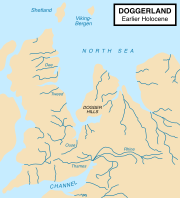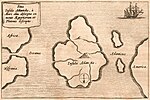| This article needs additional citations for verification. Please help improve this article by adding citations to reliable sources. Unsourced material may be challenged and removed. Find sources: "Lost lands" – news · newspapers · books · scholar · JSTOR (October 2018) (Learn how and when to remove this message) |

Lost lands are islands or continents believed by some to have existed during prehistory, but to have since disappeared as a result of catastrophic geological phenomena.
Legends of lost lands often originated as scholarly or scientific theories, only to be picked up by writers and individuals outside the academy. Occult and New Age writers have made use of lost lands, as have subaltern peoples. Phantom islands, as opposed to lost lands, are land masses formerly believed by cartographers to exist in the current historical age, but to have been discredited as a result of expanding geographic knowledge. The classification of lost lands as continents, islands, or other regions is in some cases subjective; for example, Atlantis is variously described as either a "lost island" or a "lost continent". Lost land theories may originate in mythology or philosophy, or in scholarly or scientific theories, such as catastrophic theories of geology.
With the development of plate tectonic simulation software, new lost land has been discovered and confirmed by the scientific community (like Greater Adria in 2019).
Submerged lands
Further information: Continental fragment

Although the existence of lost continents in the above sense is mythical (aside from Zealandia and Greater Adria), there were many places on Earth that were once dry land, but submerged after the ice age around 10,000 BCE due to rising sea levels, and possibly were the basis for Neolithic and Bronze Age flood myths. Some were lost due to coastal erosion or volcanic eruptions. An (incomplete) list follows:
- A large island in the Mediterranean Sea, of which Malta is the only part not now submerged.
- Balkanatolia, a sunken land in the Mediterranean Sea.
- Beringia, connecting Asia and North America.
- Doggerland, the bed of the North Sea, which once connected Great Britain to Continental Europe before being inundated by rising sea levels during the Holocene
- Ferdinandea, submerged volcanic island which has appeared at least four times in the past.
- Kerguelen Plateau, a submerged micro-continent which is now 1–2 kilometres (0.62–1.2 miles) below sea level.
- Maui Nui, once a large island of the Hawaii archipelago; several major islands represent residual high ground of Maui Nui.
- Sundaland, the now submerged Sunda Shelf.
- Viking-Bergen Banks are submerged hills in the North Sea which formed Viking-Bergen Island during the Last Glacial Period and possibly the northernmost point of Doggerland.
Lost continents
Main article: Submerged continent- Greater Adria, a continent connecting between Italy and North Africa.
- Zealandia, a scientifically accepted continent that is now 94% submerged under the Pacific Ocean, surrounding the areas of New Zealand and New Caledonia.
Mythological lands
Main article: List of mythological places
- Agartha, in the Hollow Earth.
- Atlantis, Plato's utopian paradise.
- Avalon, the mythical lost land or island in Arthurian, Cornish and Welsh legend.
- Buyan, an island with the ability to appear and disappear in Slavic mythology.
- Cantre'r Gwaelod, in Welsh legend, the ancient sunken realm said to have occupied a tract of fertile land lying between Ramsey Island and Bardsey Island in what is now Cardigan Bay to the west of Wales.
- Dvārakā the submerged city of Lord Krishna
- Iram of the Pillars, a reference to a lost city, country or area mentioned in the Qur'an.
- Jomsborg and Vineta, legendary cities on the south coast of the Baltic Sea supposed to have been submerged in the Middle Ages.
- Kitezh, a legendary underwater city located in Russia, populated by spiritual people.
- Kumari Kandam, a mythical lost continent with an ancient Tamil civilization in the Indian Ocean
- Lemuria, a mythical lost continent in the Indian or the Pacific Ocean.
- Llys Helig Welsh legends regarding the local rock formations conceal the palace of Prince Helig ap Glanawg, said to be part of a larger drowned kingdom near Penmaenmawr, Wales.
- Lyonesse in Arthurian literature: it was the home of Tristan and is usually associated with the Isles of Scilly, Cornwall (an area inundated by the sea c.2500BC). The tale parallels the Welsh and particularly Breton legendary lost lands.
- Mu, a mythical lost continent in the Pacific Ocean
- Shangri-La, a fictitious valley in Tibet, the idea of which may have been inspired by the myth of Shambhala
- Quivira and Cibola, also known as the Seven Cities of Gold. These were suspected somewhere in America by the Conquistadors.
- El Dorado, mythic city of gold.
- Ys, a mythical drowned city in Brittany, similar to other Celtic lost lands in Welsh and Cornish tradition. Most versions of the legend place the city in the Baie de Douarnenez.
In literature and philosophy
The following individuals are known for having written on the subject of lost lands (either as fiction, hypothesis, or supposed fact):
- H.P. Blavatsky
- Edgar Rice Burroughs (The Land That Time Forgot, Tarzan and the Jewels of Opar, At the Earth's Core)
- James Churchward
- Henry Corbin (Malakut or Hurqalya)
- Ignatius L. Donnelly
- Burak Eldem
- Warren Ellis
- Philip José Farmer
- H. Rider Haggard
- Robert E. Howard (Hyborian Age)
- Édouard Lalo (Le roi d'Ys)
- H. P. Lovecraft often invoked the names of lost lands of his own invention, a practice that subsequently gave birth to the Cthulhu mythos.
- Geoffrey of Monmouth first mention of Avalon in his Historia Regum Britanniae
- Plato
- Augustus Le Plongeon
- Zecharia Sitchin
- J. R. R. Tolkien (his Númenor legend is partly based on Atlantis. Beleriand, the main theatre of action in The Silmarillion is sunk at the end of the story cycle. Both Númenor and Beleriand are referenced in his most famous work: The Lord of the Rings.)
- Jack Vance (Lyonesse Trilogy)
- Samael Aun Weor
- Umberto Eco (The Island of the Day Before)
- Jules Verne (The Mysterious Island)
See also
- Flood myth
- Lost city
- Lost world
- Past sea level
- Phantom island
- Vanishing island
- Terra Australis
- Tidal island
References
- "Lost Lands". The Art and Popular Culture Encyclopaedia.
- Yeung, Jessie (23 June 2020). "Maps reveal new details about New Zealand's lost underwater continent". CNN.
- Carter, Jamie (15 Sep 2019). "Goodbye Atlantis, Hello 'Greater Adria'. A Lost Continent Has Been Mapped By Geologists". Forbes.
- Corbin, Henry (1977). Spiritual Body and Celestial Earth: From Mazdean Iran to Shi'ite Iran. Princeton University Press. p. xix-xxi.
Further reading
- L. Sprague de Camp and Willy Ley, Lands Beyond, Rinehart & Co., New York, 1952.
- L. Sprague de Camp, Lost Continents: The Atlantis Theme in History, Science, and Literature, Dover Publications, 1970.
| Continents of Earth | |||||||||||
|---|---|---|---|---|---|---|---|---|---|---|---|
| |||||||||||
| |||||||||||










